16th International Dementia Conference Programme
Day One, 8th May 2024
Plenary Stage
Parallel Stage
Tributary Stage
Doors will open at 10am.
Please follow the signs to the registration desk to sign in.
Light refreshments will be served and there will be time to visit our exhibitors and network before the conference formally opens.
Engaging Dementia CEO Kim Tully will welcome attendees to the 16th International Dementia Conference.

Kim joined Engaging Dementia as CEO in late 2020.
She has over 20+ years of experience in diverse roles for a renowned global organisation, and is enjoying her move into the community and voluntary sector. Kim has a Master’s Degree in International Business from the University of South Carolina, USA.
Brian Lawlor is a Professor of Old Age Psychiatry at Trinity College Dublin, and Site Director of GBHI at Trinity. He is a geriatric psychiatrist with an interest in dementia, late-life depression, loneliness and brain health.
Brian has worked for over 30 years on developing services and delivering care to people with dementia. His research interests range from early detection and prevention to evaluating new treatments for dementia.
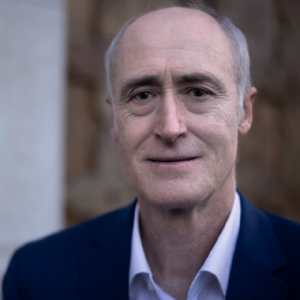
We are delighted to have Minister Mary Butler give the official opening words at this year’s conference.
Mary Butler was born and raised in Waterford. She is married to her husband Michael and has three children.
Mary is a lifelong community activist and member of the Fianna Fáil party. In 2014 she contested local elections in her local electoral area of Comeragh and won a seat. Mary then secured a nomination in 2016 to contest the General Election. She was elected to the Dáil on the first count.
From 2016 to July 2020, Butler was appointed Fianna Fail Spokesperson for Older People and Health Promotion, also chairing the All Party Oireachtas Group on Dementia.
In July 2020, Butler had the honour of being appointed Minister of State for Mental Health and Older People. Upon receiving her Seal of Office, she spoke of her delight and honour at being the first female Waterford TD to have been appointed Minister.
In 2021 Mary was elected Vice President of Fianna Fáil. During her time as Minister, Mary is very proud to have introduced legislation to modernise the Nursing Homes Support Scheme (NHSS), commonly referred to as Fair Deal, a system of financial support for people who require long-term residential care. She has also maintained a dedicated focus on ensuring ringfenced funding for dementia supports and increased Ireland’s mental health budget by 30% since entering the post.
She remains committed to ensuring that the voice and choice of older people and those living with mental health difficulties in Ireland are heard.
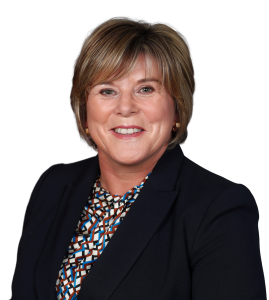
To Helen, Diversity in Dementia means recognizing the richness of every person’s experience, regardless of their memory or cognitive challenges. It’s about embracing the unique perspectives and insights that each person brings to the table, promoting an environment of inclusivity, understanding, and respect.
Dr. Helen Rochford-Brennan is an active Global Dementia Ambassador who works in capacity as:
– Advocate for awareness and the provision of services for people with Alzheimer’s disease.
– Campaigner for human rights for people with disabilities and older persons.
– Equality and women’s rights advocate.
– Focus on community development and infrastructure and employment generation in the West of Ireland.
___
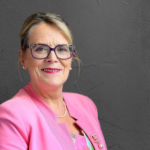
Dr. Helen Rochford-Brennan is a Global Dementia Ambassador from Ireland. Originally from Co. Sligo, Helen is former Chair Irish Dementia Working Group, Former Chair European Dementia Working Group and a Former Board Member of Alzheimer Europe.
Mairéad will talk about her programme of work and the resources that have been developed for people living with dementia and staff providing care to people with dementia.
Mairéad joined the office in January 2022 as Senior Project Manager for the implementation of “Appropriate prescribing of psychotropic medication for non-cognitive symptoms in people with dementia” (National Clinical Guideline No. 21). Prior to joining, Mairéad worked for six years in healthcare research and audit with a specific focus on dementia.
Mairéad holds a PhD in Psychology from Maynooth University. Her PhD study explored the quality of life and trauma symptoms of older persons, namely retirees. She has an extensive research portfolio having worked on a variety of research projects since 2008, with a focus on healthcare research and mental health. She has been lead author and co-author on a large number of reports, journal articles, and other publications.
There will be a short 15 minute break
Professor McCarron is the founder and Principal Investigator for IDS-TILDA – the longitudinal comparative study on ageing in persons with intellectual disability including persons with Down Syndrome, a global first.
IDS-TILDA increases understanding about how lives and chronic conditions change over time for this population, drives changes on healthcare practice and national health policy. Professor McCarron has also led a longitudinal cohort study of dementia in people with Down Syndrome spanning over 25 years, which has led to the development of Ireland’s first dedicated National Memory Service for people with an intellectual disability, where she serves as Executive Director.
___
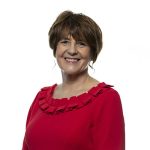
Professor Mary McCarron, PhD RNID RGN BNS FAAN FTC
Professor Mary McCarron is a Professor of Ageing and Intellectual Disability, Director of the Trinity Centre for Ageing and Intellectual Disability (TCAID); and Executive Director of the National Intellectual Disability Memory Service.

Mei Lin Yap is a graduate of Trinity College Dublin and acts as the Ambassador Liaison Officer at Trinity Centre for Ageing and Intellectual Disability (TCAID). She is a PPI contributor and as part of her role she advocates for people with intellectual disabilities and helps to shape research within the centre.
Mei Lin also chairs the PPI panel, managing a group of seven people who meet once every two months to give opinions on the research and share their lived experience. As well as this she sits on the steering committee with IDS-TILDA and the National Intellectual Disability Memory Service.
In addition to Mei Lin’s work at TCAID, she also works at CPL Recruitment Agency where she works as a Senior HR Assistant. In this work she sits on several committees, for example, the Diversity, Equity and Inclusion committee. She advocates for the inclusion of people with disabilities in many different organisations by sharing her own experience and providing recommendations for the employment of people with disabilities.
A full catered lunch will be available
More information to follow
Stephanie Kennedy will discuss how the Office of Public Works was a key partner in the creation of the AIDA Project.
The AIDA Methodology combined the experiences and know-how of the three fields of socio-medical, cultural-museum and digital into one innovative, replicable and implementable approach. The development of the Methodology resulted in learning scenarios, practice/activity sheets and a Toolkit for practitioners, educators, and operators, to put into practice during local meetings.
The project’s main objectives are – to enrich and improve the quality of life of people with dementia through the integration of art, technology, and clinical care, and the aspiration towards a dementia friendlier society for patients and caregivers alike.
___

Stephanie Kennedy is a guide and educator with the Office of Public Works based at Dublin Castle. She has worked on the AIDA project over the last 2 years, finding ways to help people living with dementia and their families to access heritage sites and activities. She holds a Masters in Cultural Event Management and her background is in Law and Social Work.
___

Dr. Louise Hooper is a leading researcher in relation to health and social care policy and supports for dementia, developing a model for a National Dementia Registry, dementia and assistive technology, and dementia-related education. She coordinates a European group examining
Innovations in diversity and equity in social health research in dementia (INTEREST).
Dr. Hooper is an Associate Professor of Psychology and Programme Chair of the BSc in Psychology and Mathematics in DCU. She is also a member of the INTERDEM group and a Board member of IPPOSI (Irish Platform for Patient Organisation, Science and Industry).
There will be a 15 minute break
The Dementia: Understand Together campaign is striving to work towards building dementia inclusive communities. This can only be done through the support of our partner organisations, community champions and local Alliances, who raise awareness and understanding in their community and inspire a dementia culture change.
Local champions have led the way by creating services and supports as well as encouraging everyone in their community to get involved and take meaningful actions. People with dementia and carers have been involved in this campaign from the start. They define what an inclusive community looks like and which actions are meaningful in a person’s life.
This interactive session will give voice to the lived experience of a person with dementia and highlight the specific community responses across three counties.
___

Fiona Foley is a Senior Project Manager at the National Dementia Office with responsibility for “Dementia: Understand Together” and “Brain Health”. Fiona was seconded to the HSE to develop the social movement framework for Dementia Inclusive Communities.
___
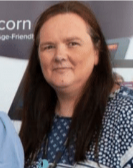
Fiona Crotty is an Administrative Officer with the Economic Community and Rural Development Section of Tipperary County Council. As the Age Friendly Programme Manager, Fiona has been supporting dementia awareness campaigns since 2020.
___
Emer Finn is an Occupational Therapist currently working in the Memory Technology Resource Room in New Ross, Wexford. Emer is the chair of the Wexford Dementia Alliance which consists of statuary and non statuary bodies who meet every quarter. The purpose is sharing information and carrying projects which support people living with dementia and their family/supports.
___
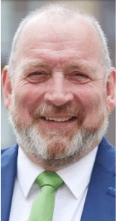
Dr. Kevin Quaid was first diagnosed with Parkinson’s, just over 9 years ago, then later diagnosed with Lewy Body Dementia. He is the current Chair of the Irish Dementia Working Group, the Vice Chair of the European Working Group of People With Dementia and, the Co-founder of Lewy Body Ireland. He is the author of two books about Lewy Body Dementia.
In 2022 he was presented with ‘The Presidential Award’ from Longford International College Ireland, for “his outstanding achievements in bringing awareness of Lewy Body Dementia not just in Ireland but globally too” and in November 2023 Kevin was awarded an Honorary Doctorate of Philosophy by the Rushford College and the Longford International College.
Paul will provide an overview of the Model of Care for Dementia.
The Model of Care for Dementia sets out the optimum care and support pathways for people living with dementia, from the point of concern when first noticing symptoms (e.g. change in cognition, behaviour, memory, mental health, mood or personality) to receiving a variety of supports in the community and at home. It describes adaptable pathways of care that maximise the use of existing structures, the enhancement of current services and new service requirements. It also outlines integrated working across services and personalised care to reach the outcomes most important for each individual.
___
In February 2023, Paul joined the National Dementia Services team as Programme Manager. He supported the delivery and launch of the Dementia Model of Care (MoC) in May 2023. He currently focused on implementing the MoC through the operationalisation of services, increasing public awareness and expansion of dementia education opportunities.
Paul originally qualified as an Occupational Therapist (OT) from the University of Salford, Greater Manchester in 2006 where he then joined Beaumont Hospital as a Staff Grade Occupational Therapist. In 2010 he commenced his role as Senior OT in Care of the Elderly at St Joseph’s Rehabilitation Unit. He has worked in all areas under the Care of the Elderly umbrella at Beaumont Hospital including the acute setting, rehabilitation and day hospital. Between 2015-2017, he worked in Beaumont Hospital’s Emergency Department as the Clinical Specialist OT on the award winning Frail Intervention Therapy Team (FIT Team), the first team of its kind nationally. He has been a member of the National Health and Social Care Professions (HSCP) Unscheduled Care group, the National Clinical Programme for Older Persons (NCPOP) and a member of the Association of Occupational Therapists, Ireland (AOTI). He worked as the Occupational Therapy Manager in Charge III at Beaumont Hospital between October 2017 and February 2023 where he co-designed and operationalised an OT Advanced Practice service split between the Orthopaedic Virtual Trauma Assessment Clinic (another first, nationally) and Plastics upper limb injuries and conditions. He was also involved in operationalising the Slaintecare funded Pathfinder service, a joint initiative between Beaumont Hospital and the National Ambulance Service. This team respond to low acuity 999 calls from service users who are ≥ 65 years of age and place the patient on the most appropriate pathway; remain at home with/without support, or conveyance to the ED. This service has since expanded to other hospitals nationally through additional funding.
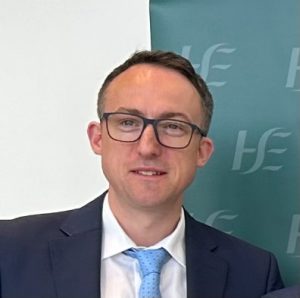

Orlaith Leonard works as a dementia advisor for the Alzheimer Society of Ireland covering Longford and Westmeath. Her role involves supporting people of any age who have been diagnosed, or who are awaiting a diagnosis of dementia, or are worried about their memory. Through her work she provides information, advice and emotional support to people living with dementia and their families and carers.
Every day is a different day, and her role can be very varied, with many challenges but she knows that she can sit down with people, share a cup of tea and some memories which always helps ease the burden’s. She is very privileged to be in her role to meet such fantastic people and to see them living well with dementia. She has a special interest in helping the community understand messages about dementia and helping improve the quality of care for people with dementia.
___
To get contact details for your local Dementia Adviser, phone the Alzheimer Society Helpline 1800341341 or see their website: www.alzheimer.ie/service/dementia-adviser
Closing words will take place in the main ballroom with closing comments from Kim Tully.
As a special treat, we will be ending the first day of the conference with a special performance of We will tell everyone! This song was written by a Public and Patient Involvement (PPI) group who collaborated with Lisa Kelly on her PhD research on telehealth music therapy for people living with dementia and their supporters. The song explores the group’s experiences of living with dementia, facilitated by esteemed songwriter Carl Corcoran and Lisa Kelly. The song will be performed by Helen Rochford-Brennan, Carmel Geoghegan, Kevin and Helena Quaid and Gerry and Nuala Paley. Audience participation will be warmly welcomed.
Doors will open at 10am.
Please follow the signs to the registration desk to sign in.
Light refreshments will be served and there will be time to visit our exhibitors and network before the conference formally opens.
Presentations on the parallel stage will begin at 11:30am
Currently there is no specialised physiotherapy service for managing patients with complex neuro-cognitive syndromes such as: Dementia with Lewy Bodies, Corticobasal Syndrome, Progressive Supranuclear Palsy, Fronto-temporal Dementia and Huntington’s Disease.
The Dementia Strategy 2023 supports the requirement for a specialised physiotherapy service for these patients within a regional specialist memory clinic, and the development of appropriate care pathways for continuity of care. Evelyn will discuss the development of this specialist service.
___
Evelyn Kimmage is a Physiotherapist with 10 years of clinical experience. She graduated from Trinity College Dublin in 2014. In September 2023 Evelyn commenced in the role of Clinical Specialist Physiotherapist in the memory clinic in Tallaght Hospital. Since then she has been working to promote the role of Physiotherapy for patients with complex motor-cognitive syndromes and establish a specialist Physiotherapy service for this patient cohort.
Eugene Matthews will provide a summary of the evidence to date that shows how specific nutrients of the macula can be enriched to improve macular pigment. These dietary nutrients include the macular carotenoids, lutein, zeaxanthin and meso-zeaxanthin. Noteworthy, the concentrations of these carotenoids in the macula correlate to their concentration in the brain.
Eugene will explain the health benefits of these nutrients by discussing their optical (for eye), antioxidant, and anti-inflammatory properties. Using published studies from the Nutrition Research Centre Ireland (NRCI), he will discuss the benefits of using these nutrients for patients with age-related macular degeneration (AMD) as demonstrated in the published CREST study, and for patients with Alzheimer’s disease as demonstrated in the published reMIND study
___
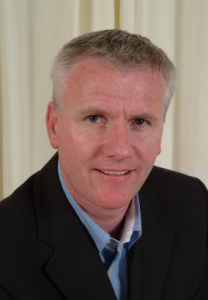
Eugene Matthews commenced work with West Midland Optical Ireland Ltd. in 1992. In 2000, together with Declan Counihan, Eugene took over West Midland Optical and formed WMO Healthcare in the following years. In 2008 Eugene was introduced to Prof John Nolan (NRCI). Eugene has followed Prof Nolan’s work closely over the years and was responsible for launching numerous products, such as MacuPrime and ReMind, for the research based prevention of AMD and Alzheimer’s Disease.
There will be a short 15 minute break
Nancy Brown will discuss the founder of The Validation Method –
Naomi Feil

Validation is a non-pharmacological method of communicating with older adults living with cognitive decline. Developed in the 1960s by social worker Naomi Feil, the Validation method draws inspiration from Erikson’s Developmental Stage Model, Rogers’ counseling psychology, and Maslow’s Hierarchy of Needs. The Feil method introduced techniques that align with theories from humanistic psychology and was the first method that put person-centered care into practice
___

Nancy Brown has 18+ years experience in dementia care. As a practitioner-researcher and specialist working with older adults living with advanced dementia, she is also a PhD candidate in dementia studies at the University of Edinburgh. She is a Certified Validation Teacher and serves as Deputy Director for Communications of the Validation Training Institute; Communications Chair for the Non-Pharmacological Interventions interest area of Alzheimer’s Association International; Executive Committee member of SDRC (Scottish Dementia Research Consortium); and, ECRED research team on arts engagement with persons living with dementia.
Susan and Aisling will share the details of the podcast series: DemTalks, discussing how the topics were chosen, how they found experts/professionals to take part in the podcast, how the podcast has been received, and the lessons learned from creating the podcast.
The podcast series has seven episodes, and the topics have been chosen by the Dementia Carer’s Campaign Network members to cover a wide range of subjects. Each episode features a family carer/DCCN member, an interview with a carer in the public eye, and an expert/professional on the topic.
___
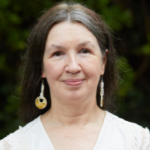
Susan Crampton is Vice-Chair of the DCCN. She has been involved in policy and clinical guideline consultations and focus groups, political advocacy, speaking at events and conferences, and raising awareness of the issues affecting carers of those living with dementia, including using the arts as an innovative way of communicating to an audience outside the dementia community. She was a supporter, carer and advocate for her late Mom, Anne, who lived with mixed vascular and Alzheimer’s dementia until her passing in 2017.
___
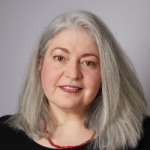
Aisling Harmon returned from the UK in 2006 to care for both parents, most recently her Mum Carmel, who had Parkinson’s Disease and dementia until her passing in 2023.
A passionate advocate for family carers, Aisling has particular interest in representing the carer voice at research and advocacy events. She is member of the Dementia Carers Campaign Network (DCCN) supported by The Alzheimer Society of Ireland, since 2016 and is currently on the Committee.
A full catered lunch will be available
Adults with Down Syndrome (DS) are at significantly increased risk of developing dementia as they get older. There is growing evidence that, for people in the general population, engaging in cognitively stimulating activities can serve as a protective factor against dementia. However, few studies have investigated the benefits of cognitive stimulation for adults with DS.
Dr. Sharon Hardiman will discuss her studies into the feasibility and efficacy of a standardised 14-session group-based Cognitive Stimulation Therapy (CST) programme adapted for adults with DS.
____
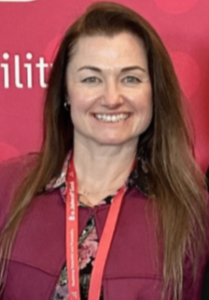
Dr. Sharon Hardiman is a Senior Clinical Psychologist working in Saint John of God Intellectual Disability Services Dublin. She has worked there for the past twenty years and takes a leading role in the provision of clinical supports to adults at high risk of dementia and to adults with diagnosed dementia. She is excited to be working with Dr Flavia H. Santos (UCD) in leading the Brain Busters Project.
Muriel and Doírín will be looking at young adults, neuro-diverse adults, and those with early onset dementia – how society is adapting (and needs to adapt) to be inclusive; specifically relating to the impact of the commencement of the Assisted Decision-Making (Capacity) Act 2015 in 2023, and how it can be of benefit to those groups.
___
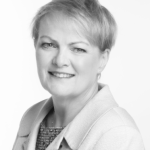
Muriel Moore is a public interest law solicitor, her practice rooted in a commitment to human rights. She has a special interest in protecting the rights of vulnerable people to make their own decisions and obtain the services they need to live a full and rewarding life. Muriel is also registered with the Decision Support Service (DSS) as a Panel DMR (Decision Making Representative) and works with a number of advocacy groups representing people with dementia and their carers.
___

Doírín Mulligan has worked in the areas of Family Law and Child Care law for over fifteen years. She has been involved in numerous Child Care Law cases in both the District and High Court and has a detailed knowledge of both the needs of the parties and approach of the Courts in these cases. Doírín’s view is that the voice of the child and of vulnerable people must be heard, and that their will and preference must take priority.
Emmet will provide a summary of the conditions that he encounters within his role as cANP, and the challenges faced by this cohort of people. These include Progressive Supra Nuclear Palsy, Corticobasal Syndrome, Early onset Alzheimer’s disease, Huntington’s disease, Fronto-temporal dementia and Lewy Body dementia.
The aim of the cANP role is to provide a full holistic assessment, treatment and follow up of all symptoms /issues relating to these neuro-degenerative conditions.
___
Emmet Kelly qualified as a general nurse in January 2000 (DCU/Beaumont). After roles as staff nurse (7 years) and a CNM for over 11 years, he worked as a General Neurology Nurse specialist for 5 years focusing on neurodegenerative illness , migraine, epilepsy and general neuro- inflammation. He completed Higher Diplomas in Gerontological Nursing (TCD 2017) and Chronic Illness management (UCD 2023). He commenced a new role as Advance Nurse Practitioner (candidate) in Rare Neurodegenerative Diseases in TUH in June 2023. He is currently attending TCD in Year 1 of MSc Advanced Practice.
There will be a 15 minute break
Lizzie will give an insight into the award-winning House of Memories dementia awareness programme, created by National Museums Liverpool.
House of Memories is a museum-led dementia awareness programme which offers training, access to resources, and museum-based activities to enable carers to provide person-centred care for people living with dementia.
Museums are experts at recording and caring for people’s memories. Using their experience in reminiscence work, as well as access to museum objects, House of Memories’ unique and innovative training and resources support carers to creatively share memories with the people living with dementia that they are caring for.
___

Lizzie Salter is the House of Memories Programme Manager within National Museums Liverpool. Lizzie manages the development of programmes within House of Memories and works with the team and partners to create, deliver and evaluate dementia friendly activities within the museums, as well as in community settings.
Story telling is a way to define, make meaning and construct the self and we are three story tellers who believe that this is as important for people with dementia as it is for any of us. Despite this we know that social isolation is both a risk factor and a symptom of worsening dementia. We wanted to explore if people with dementia would enjoy a story telling group and to record those stories in a beautiful way that they could keep for the uncertainties in the future. We asked people to bring an object that has been in their possession for a long time and tell the group the story of that object.
Objects appeal because they are tangible (which can help scaffold memory) and culturally linked. We found distinct gender differences in the types of object stories told and clear distinctions between rural and city life. During the group a professional photographer recorded photos of the objects, portraits of the person and subsequently we travelled to the site of the story to record the sense of place described. These travels took us to Knock, the Dublin docklands and a bog which was the start of a love story. We recorded the stories and then a poet, using only the words of the individual made poetry out of the recordings.
___

Kate Irving is a jointly appointed Professor of Clinical Nursing and Dublin City University and Community Health Organisation 9. Kate has a PhD from Curtin University Western Australia. Kate coordinated the FP7 funded In-MINDD study on dementia deterrence and has partnered in many more international research projects.
___
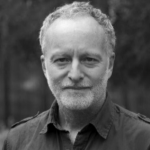
Alex Kornhuber is a Peruvian-German photographer. He has worked as a photojournalist in Kosovo, Uganda and Latin America. He is currently a senior fellow at the Global Brain Health Institute (GBHI) at the University of California, San Francisco (UCSF) and is working on two projects in collaboration with neurologists and medical doctors: one with GBHI and the Alzheimer’s Association, A Photographic Perspective on Aging in Peru; another with the Atlantic Institute, Barriers to Access Health Care in Rural Peru.
___
Cathy Fowley holds an MA in Translation Studies and a PhD in Internet Research. Her autoethnographic work, often in poetry form, has been published in academic books and journals, her poetry in Drawn to the Light, Corvid Queen and the Storms. She is a writer, poet, and facilitator of memoir writing who lives between Dublin and County Mayo.
Doors will open at 10am.
Please follow the signs to the registration desk to sign in.
Light refreshments will be served and there will be time to visit our exhibitors and network before the conference formally opens.
Presentations on the tributary stage will being at 11:40am
This poster presentation aims to shed light on the often-overlooked challenges of Young Onset Dementia within the context of a specialized dementia day centre. Christine and Ana will explore unique aspects, interventions, and support systems tailored for individuals facing dementia at a younger age, as well as going beyond the diagnosis of dementia and showcasing the impact in younger families.

Christine King
“The Heart and Soul of Mimi Care Group”. Parallelly, she successfully owns a homecare company for the last 13 years. Her commitment to caring for others extends beyond professional duties. For Christine, every individual is more than a client – they are part of a community built on kindness and empathy.
Christine will be joined by Ana Oliveira – Clinical Nurse Manager.
National Clinical Guideline No. 21 (“Appropriate prescribing of psychotropic medication for non-cognitive symptoms in people with dementia”) was published in 2019 to address a priority action of the National Dementia Strategy in Ireland. A key component of its Implementation Programme is the development and delivery of a Facilitator Education Programme.
Rachel and Sheena will discuss the core elements of the programme, emphasizing the importance of understanding how the person wishes to be cared for, in their unique and personalised way, prior to considering the prescription of any psychotropic medications.
___
Rachel Ward is a Project Facilitator for the implementation of “Appropriate prescribing of psychotropic medication for non-cognitive symptoms in people with dementia” (National Clinical Guideline No. 21) with the HSE National Dementia Services. Previously she worked as a nurse in the acute hospital setting in Midlands Regional Hospital Tullamore and has recently completed a Masters in Occupational Health and Safety with UCC
___
Sheena Farrell currently works as a Project Facilitator with Rachel within the HSE National Dementia Services. Her particular areas of interest include values based healthcare provision, human factors in healthcare and the maintenance of personhood and citizenship as we age. She is a qualified Registered Nurse and has worked as both an Older Persons Nurse Specialist, and as a Clinical Tutor.
Jane Gaffey had worked with both the ASI and the Irish Cancer Society where she conducted studies in the area of cancer research. From working in both of these areas, she began to construct a project based around comorbid cancer-dementia as the large dearth of research in this area became apparent. Thus, comorbid cancer-dementia is the subject of her PhD project and her presentation.
___
Jane Gaffey is currently in her first year of a PhD in Psychology. She have previously worked on numerous research projects in the area of dementia, including working with the Alzheimer’s Society of Ireland in evaluating the Creating a Dementia Inclusive Generation Programme, and the AIDA project.
Sr. Siobhán will discuss how her poster demonstrates how the rich contribution of a theological foundation of mission and ministry can underpin good holistic, person-centred care of people of all ages living with a dementia. The need for recognition and appropriate, timely response to the needs of the younger person with a dementia is highlighted. Greater awareness, family support and seamless collaboration of statutory and voluntary services is essential to further develop and enrich the lives of all people living with a dementia and their families.
___

Sr. Siobhán O’Keeffe is a Registered Nurse, and holds a B.A Hons Health Promotion, a M.A in Applied Theology, Justice, Peace and Mission, as well as a Diploma in Teaching Methods for Nurses and a Diploma in Person Centred-Dementia Care.
She set up a UK National Lottery funded community-based support service for young people with Younger Onset Dementia, managed two nursing homes and worked in community palliative care.
She is the Co-Ordinator of the Union of International Superior Generals (Religious Sisters) Cognitive Impairment Programme and have offered spirituality and dementia care training in Ireland, England and U.S.A. She is also a published author.
Maria Carolina Roratto will discuss the use of Creative Art Therapy (CAT) as a non-pharmacological intervention for individuals with dementia in long-term care through her experience at Leeson Park Nursing Home. The study aims to evaluate CAT’s impact on residents’ cognitive and emotional well-being, social engagement, and overall quality of life.
___
Maria Carolina Roratto is an Activities Co-ordinator at Silver Stream Health Care. She conducted this study adhering to ethical guidelines, prioritizing resident autonomy, confidentiality, and informed consent, recognizing the vulnerability of individuals with dementia.
This workshop demonstration on hand massage to alleviate anxiety for a person living with dementia is part of an education programme developed by members of the Dept. of Nursing and Midwifery, at the University Limerick . This programme outlines the theoretical basis to hand massage in alleviating anxiety for people living with dementia and provides a 4minute video of hand massage techniques as well as giving a practical demonstration.
___
Dr Dympna Tuohy (PhD, MSc, Grad Dip., BNS) is a registered General Nurse and a registered Nurse Tutor. She has taught and been involved in nurse education, teaching & assessment for many years. Her current research areas of interest include Day care centres and people living with dementia, Intergenerational Cafés and Nursing metrics. She is a team member of an all-Ireland funded research project on digital resources surrounding delirium. Together with colleagues, she has developed an online hand massage programme to help alleviate anxiety in people living with dementia.
___
Dr Margaret Graham (RGN, RNT, MSc, PhD) Her research and scholarly activity include caring, person-centred practices and older people nursing with undergraduate and post graduate students. She has a particular interest in developing practice through narrative research methodologies. Currently involved in research around Intergenerational Cafés promoting dialogue between students and older people.
___
Dr Teresa Tuohy (PhD, MSc, BSc, Dip) is a registered Psychiatric Nurse, registered General Nurse and a registered Nurse Tutor). She has worked as a CNS in older person services both in community and in residential settings. She has a particular interest in dementia care; assessment and management. More recently she has worked in nurse education/
___
Dr Kevin Johnson (PhD, M.Eng, B.Eng) is the Senior AV Technician in the Department of Nursing and Midwifery in the University of Limerick. His research interests are varied and include pedagogic support, simulation, AV technology, e-learning, learning technology and drone engagement.
A full catered lunch will be available
Validation is a method of communicating and being with older persons who may be disorientated. It is a practical way of working that helps reduce stress, enhance dignity and increase happiness. Validation is built on an empathetic attitude and a holistic view of individuals.
Nancy Brown is a Certified Validation Teacher with the Validation Training Institute, and conducts webinars, workshops, and consultations for professional staff, volunteers, families, and caregivers internationally. She has 18+ years experience in dementia care in a memory day center serving all levels of cognitive impairment. As a practitioner-researcher and specialist working with older adults living with advanced dementia, she is also a PhD candidate in dementia studies at the University of Edinburgh.

Nancy Brown serves as Deputy Director for Communications of the Validation Training Institute; Communications Chair for the Non-Pharmacological Interventions interest area of Alzheimer’s Association International; Executive Committee member of SDRC (Scottish Dementia Research Consortium); and, ECRED research team on arts engagement with persons living with dementia.